Synthroid medications are the brand name for thyroid medication Levothyroxine. The Synthroid generic form is Levothyroxine. In this blog, we will discuss about Synthroid medication for thyroid, Synthroid drug class, Synthroid vs Levothyroxine, and Synthroid drug information that you must know about this drug.
What is Synthroid?
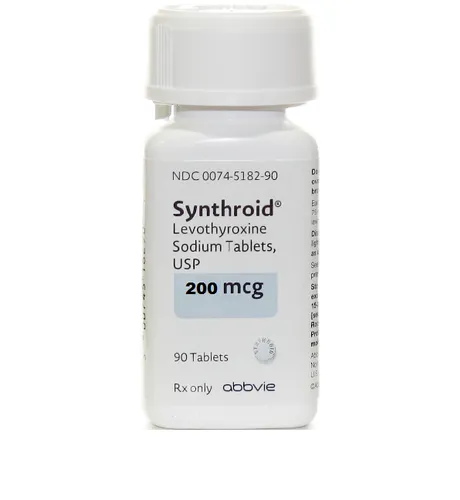
Synthroid is a prescription-only drug used to treat hypothyroidism. This medication is prescribed when your thyroid is not producing enough hormones naturally. Synthroid medications are also used in patients who require radioiodine therapy or surgery in order to manage a certain type of thyroid cancer known as well-differentiated thyroid cancer.
Synthroid Dosage Strengths
Synthroid is accessible in various strengths including Synthroid 25 mcg, Synthroid 50 mcg, Synthroid 75 mcg, Synthroid 100 mcg, Synthroid 125 mcg, Synthroid 150 mcg, Synthroid 175 mcg, and Synthroid 200 mcg.
Other Synthroid dosage strengths available are 88 mcg, 112 mcg, 137 mcg, and 300 mcg.
Synthroid Uses
Synthroid medications are prescribed to treat primary, secondary, and tertiary hypothyroidism in adults as well as children. This drug is also used to suppress thyroid-stimulating hormone levels in adults after surgery and radioactive iodine treatment in patients with thyroid cancer.
Synthroid can also be used to treat congenital (present at birth) or acquired (developed later in life) hypothyroidism.
How Does Synthroid Medication Work?
Low thyroid hormone may occur naturally or if the thyroid gland is injured by medications or radiation or eradicated by surgery. Having sufficient thyroid hormone in the body is essential for maintaining normal physical and mental activity in adults and normal physical and mental development in children.
Synthroid helps reestablish thyroid levels in the body by replacing the amount of thyroxine that the body is missing. Synthroid replaces thyroxine when your thyroid gland is unable to produce preventing the symptoms of underactive thyroid or hypothyroidism.
Synthroid starts working right after you start with this medicine. However, it may take several weeks to show noticeable improvements in symptoms.
The inactive ingredients contained in this drug may cause allergic reactions. Talk with your doctor about your medical history and if you are allergic to certain substances.
How Long Does Synthroid Last
Synthroid stays in your system for 4 to 6 weeks. It may take longer (around 6 weeks) for patients with hypothyroidism to eliminate Synthroid than those with regular thyroid function.
The half-life of Synthroxine (the time drug takes to reduce to half of its original amount in the blood) is 6 to 7 days. After around 5 halflives a medicine is completely removed from the body.
How To Take Synthroid Correctly?
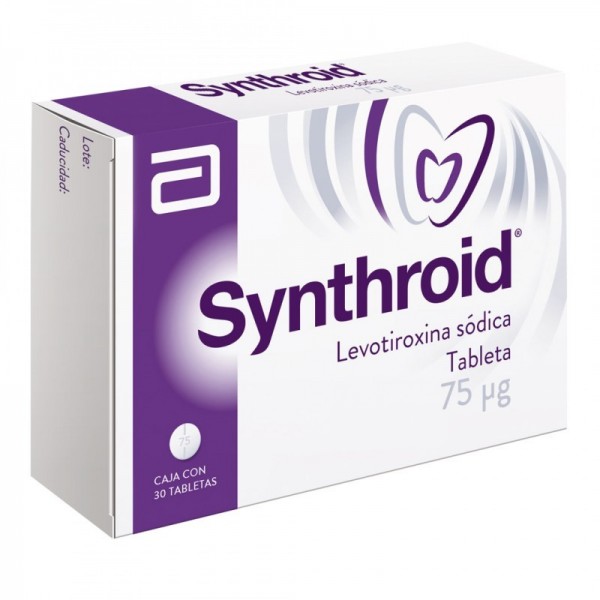
Synthroid for thyroid comes in form of tablets that needs to be taken by mouth without food (on an empty stomach). Usually, it is recommended to take Synthroid tablets 1 hour before the first meal. For the best results from this medication, you should take it at the same time every day.
Make sure you strictly follow the instructions prescribed by your doctor or health care provider. Also if you are taking certain drugs that may interfere with the effectiveness of Synthroid, maintain at least 4 hours gap between the dosage of both drugs.
Make sure you read and stick to the patient information leaflet carefully before you start taking Synthroid and every time you begin with a refill. If you are prescribed a Synthroid capsule, do not crush, split or chew it, swallow it as it is.
For pediatric patients, if children can not swallow the tablets, you can crush the tablet to mix it in 2 tablespoons of water. You can give this using a dropper or spoon. Do not prepare this liquid in advance or mix Synthroid tablets with soy infant formula.
Typical Synthroid Dosage
Typically your doctor may prescribe you a lower-strength starting dose that delivers the desired effect. The healthcare professional may increase or reduce Synthroid dosage to make sure the Synthroid is helping you attain thyroid-stimulating hormone therapy goals.
In the hypothyroid patient with moderate to severe symptoms of hypothyroidism, your healthcare professional may begin Synthroid treatment at a full replacement dose of 1.6 mcg/kg per day.
The prescription medicine Synthroid dosage must be prescribed depending on your age, weight, concomitant medications, cardiovascular status, and particular etiology of the medical condition that needs to be treated.
The dosage information mentioned here is the typical dosage that is usually prescribed by doctors. However, your doctor may prescribe a different dose for you that fits your particular needs. Make sure you follow the dosage instructions provided by your doctor or pharmacist.
Dosage for Hypothyroidism
The exact dosage of Synthroid depends on the cause of the condition and how long you have been detected with this condition. For adults, the dosage of Synthroid is based on your condition and weight.
For newly detected primary hypothyroidism in adults 1.6 mcg/kg once a day for 4 to 6 weeks. For example, if you are 68 kg, you can take Synthroid from 100 mcg to 112 mcg per day as your starting dosage. Your doctor may need to adjust your Synthroid dosage every 4-6 depending on the response to treatment.
For primary hypothyroidism (severe and long-lasting) Synthroid 25 mcg once a day for 2 to 4 weeks.
Secondary or tertiary hypothyroidism 1.6 mcg/kg once a day for 4 to 6 weeks.
For the treatment of hypothyroidism, a Synthroid dosage higher than 200 mcg in 24 hours is generally considered a high dosage. 300 mcg is the maximum dosage for hypothyroidism, If you need more than 300 mcg every day, it suggests that Synthroid medication is not effective to treat your particular condition.
Dosage for Thyroid Stimulating Hormone (TSH) in adults
Synthroid medication is approved for use to decrease TSH levels as a part of thyroid cancer treatment in adult patients. The goal of TSH suppression treatment is to maintain TSH levels lower than 0.1 IU/L.
The typical dosage is 2 mcg/kg once a day. For eg. If your weight is 68 kg you can take 137 mcg per day as the initial dosage. However, your doctor may suggest a Synthroid dosage lower or higher than 2 mcg/kg depending on your existing TSH levels, treatment goals, and type of thyroid cancer.
Your healthcare provider may keep monitoring your TSH levels throughout the treatment and adjust the dosage accordingly if required. Your healthcare professional may also use serum-free T4 level to titrate Synthroid dosing.
Synthroid Dosage For Children
Synthroid is approved to treat hypothyroidism in pediatric patients. The exact dose of Synthroid for children depends on their weight and age.
If your child is 0 to 3 months the Synthroid medication dosage will be 10-15 mcg/kg. For 3 to 6 months 8-10 mcg/kg, for 6 to 12 months 6-8 mcg/kg, for 1 year to 5 years old children 5-6 mcg/kg and for 6 to 12 years 4-5 mcg/kg. For children 13 years and older 2-3 mcg/kg.
For adolescents who have completed puberty 1.6 mcg/kg. Their dose may be adjusted by the healthcare provider during the treatment as required.
What If Synthroid Dosage Is Too High?
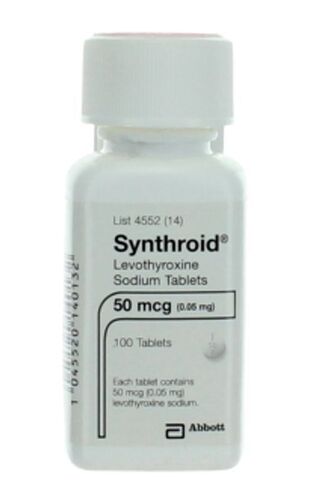
If your Synthroid dosage is too high, it may cause high levels of thyroid hormone. Too much thyroid hormone can make you experience symptoms of hyperthyroidism (high thyroid hormone levels) that are opposite to hypothyroidism.
Signs of too much Synthroid may include diarrhea, trouble sleeping, irritability or nervousness, hyperactivity, muscle weakness, oversensitivity to heat, increased appetite, increased urination, and bowel movement, palpitations or fast heart rate, shakiness, trembling hands.
If you experience these symptoms of too much Synthroid stop taking Synthroid and talk with your doctor. Seek medical attention in case of too much Synthroid side effects. Your doctor or healthcare professional can test your thyroid hormone levels and adjust your Synthroid dose if required.
Can Too Much Synthroid Make You Tired
Some patients may feel tired while undergoing Synthroid treatment. Fatigue is among the common side effects of Synthroid. You may feel tired while taking Synthroid because this medication effectively reduces hormones in your body. Due to these changes, fatigue can be felt in some people.
It goes away after you stop taking the medication. In case you are feeling tired you can talk to your doctor and they may make dosage adjustments.
How To Manage a Missed Dose?
If you forgot to take your Synthroid tablet, take it immediately as you realize. However, if you remember when it is almost time for your next dose, you can skip the missed dose and continue with your next scheduled dose.
If you have any confusion about a missed dose, talk with your doctor or pharmacist for the best medical advice. Do not get a Synthroid double dose in order to compensate for the missed one. It can increase the risk of side effects of Synthroid.
Synthroid Overdose
Do not take Synthroid if your doctor has not prescribed it to you. Using more than the prescribed dose or unprescribed dose can lead to serious side effects. Symptoms of Synthroid overdose include heart rhythm problems, heart attack, muscle spasms, headache, shortness of breath, muscle weakness, and tremors.
In case of too much Synthroid or Synthroid overdose, call your doctor immediately. You can also seek medical attention from your local poison control center or nearest emergency room.
Where to Buy Synthroid Medication for Thyroid?
If you are planning to buy Synthroid direct from a pharmacy, you can only do that if you have a prescription from a licensed doctor. Using Synthroid thyroid medication needs proper management and observation from an experienced healthcare provider so you can not buy Synthroid over the counter.
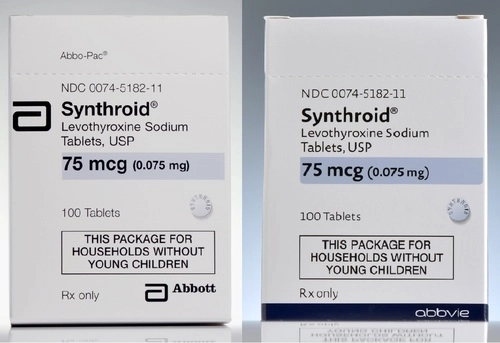
Can I buy Synthroid medication online? Yes, of course, you can buy Synthroid thyroid medication online. If you do not have a prescription, licensed medical professionals can prescribe Synthroid online after you complete the process.
Once the doctors evaluate that you are thr right candidate for this drug, they issue a prescription to Synthroid pharmacy and you can easily get delivered the medication at your door. You can book your appointment with a Synthroid pharmacy to speak with their online doctors.
Generic Synthroid is covered is mostly covered by many insurances and Medicare plans. However, Synthroid coupons such as Sythroid 100 mcg coupon or cost may be lower. Synthroid medication cost may vary depending on the form, strength, brand, and pharmacy you are buying from.
To get the best Synthroid cost prices you can do a Synthroid cost comparison on various online pharmacies offering Synthroid medication. Synthroid 100 mg cost may be different from Synthroid 50 mcg and Synthroid 25 mcg.
Generic medicines are usually cheaper than brand-name versions. If you need a cheaper version then you can get generic Levothyroxine as both have versions containing the same active ingredient that works to restore thyroid levels in the body.
The Synthroid Delivers Program offers brand-name Synthroid medication conveniently and consistently at great prices and without any delivery charges.
Is Synthroid A Hormone Replacement
Hypothyroidism or underactive thyroid is generally treated with daily hormone replacement tablets such as Synthroid. Synthroid or generic Levothyroxine is used to manage low thyroid levels (hypothyroidism) as a thyroid hormone replacement therapy.
Synthroid replaces the thyroxine hormone in your body when your thyroid is not able to produce enough of it. It can also be combined with other certain other therapies in order to treat some types of thyroid cancer.
Synthroid Interactions
Certain medications and supplements can reduce the amount of thyroid hormone absorbed by your body. These medications include Cholestyramine, Colesevelam, Colestipol, antacids, Simethicone, Sucraflate, Ironm, Calcium supplements, sodium polystyrene sulfonate, Sevelamer, Lanthanum, and Orlistat among others.
While treating hypothyroidism, drug interactions can affect thyroid hormone pharmacokinetics and metabolism that may influence the therapeutic response to Synthroid. For example calcium carbonate may bind to this drug.
These interactions may influence the way Synthroid work and even increase the chances of side effects. If you are taking any of these medicines tell your doctor and ask for advice. Usually, it is recommended to maintain at least 4 hours gap between their dosage.
Limitations of Synthroid Use
Synthroid is not indicated to use for suppression of benign thyroid nodules as well as non toxic diffuse goiter in iodine sufficient patients. there are no clinical benefits for that. overtraetment with Synthroid in this case may cause hyperthyroidism.
Synthroid is not indicated to use for traeting hypothyroidism during subacture thyroiditis recovery phase.
Synthroid Warnings (Thyroid HOrmones)
Thyroid hormones including Synthroid classification medication should not be used for weight loss or to treat obesity either separately or in combination with other therapeutic agents.
In euthyroid patients, doses based on daily hormonal requirements are unsuccessful for weight reduction. Larger doses of Synthroid can cause serious and life-threatening toxic effects especially if used with sympathomimetic amines.
Synthroid And Osteoporosis
Poor management, improper use, or too much use of thyroid medication Synthroid can lead to the risk of fracture and increased bone loss. Taking thyroid hormones for long-lasting periods or several years may lead to the development of osteoporosis.
People who are put on Synthroid or other thyroid medications for life can be at risk of getting osteoporosis. Looking closely into the concerned research, it is found that whether too much thyroid is produced naturally in the body or taken as a thyroid medication in form of Synthroid may lead to weaker bones.
So the conclusion is, Synthroid is not the real culprit but the real culprit is higher levels of thyroid or too much Synthroid or thyroid medicines. If you are taking Synthroid get your thyroid levels tested every 6 months.
Synthroid Medication Side Effects
The most common Synthroid side effects in women include muscle weakness, headache, nervousness, skin rash, diarrhea, trouble sleeping, and leg cramps. Usually, these Synthroid side effects get better without requiring medical treatment.
As such there are no dangers of taking Synthroid however, Synthroid may cause serious side effects due to long-lasting use and too high dosage of this drug. Very serious side effects of Synthroid occur because of improper use and poor management of this medication.
Serious side effects of Synthroid that may need medical attention include irregular heartbeats, chest pain, shortness of breath, fever, sweating, weakness, feeling cold, insomnia, memory issues, irritability, partial hair loss, irregular menstrual cycle, appetite changes, hot flashes, tremors.
If you experience any of these symptoms or any side effects that trouble you get immediate medical help or talk with your doctor.
Synthroid Vs Levothyroxine
Are Levothyroxine and Synthroid the same? Levothyroxine is a generic Synthroid. Synthroid is the brand name and Levothyroxine is the generic name for the drug. Synthroid and Levothyroxine both are human-made thyroxine hormones used to treat low thyroid levels.
Levothyroxine vs Synthroid. Many people are confused that Levothyroxine sodium and Synthroid are the same and which of them is better. Levothyroxine generic name and Synthroid brand name both drugs contain the same active ingredient that is Levothyroxine. In most cases, it does matter if you are taking a generic or brand-name version of the medication.
What Is Levothyroxine
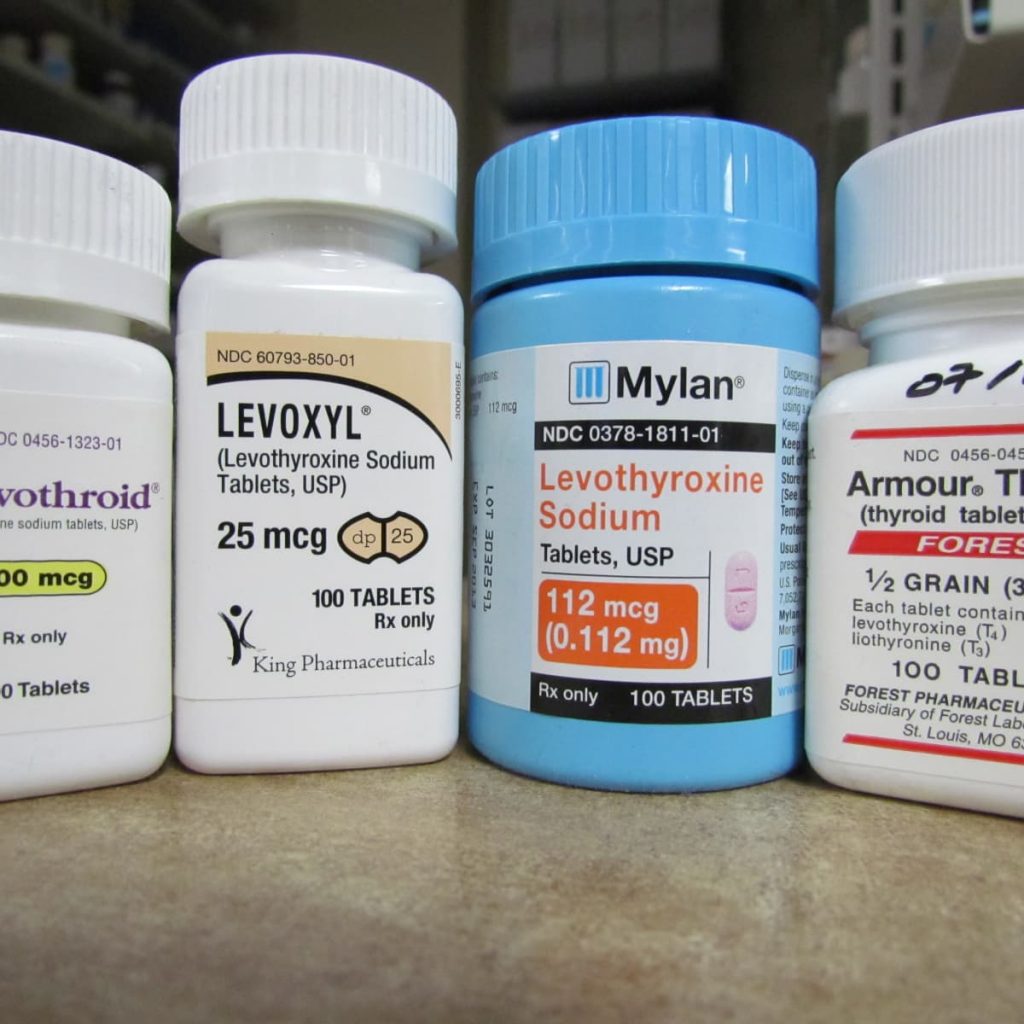
Levothyroxine medication is widely used to treat the low level of thyroid or Hypothyroidism. Thyroid glands produced thyroid hormones in the body that help regulate growth and energy levels.
Levothyroxine is available in various strengths and colors. Levothyroxine dosage strengths include:
- Levothyroxine 25 mcg (orange)
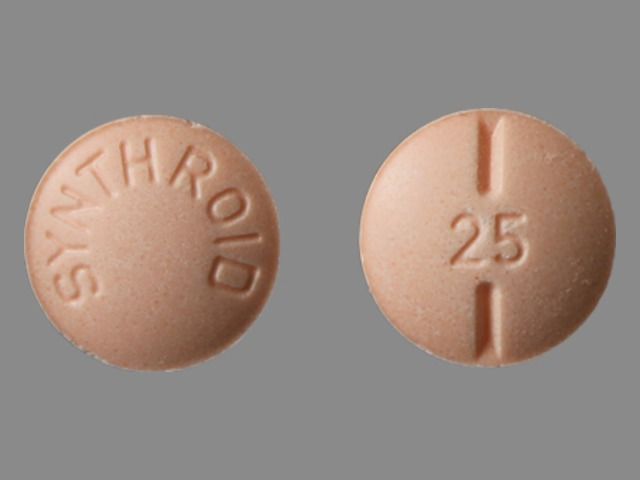
- Levothyroxine 50 mcg (white)
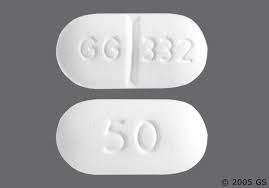
- Levothyroxine 75 mcg (purple)
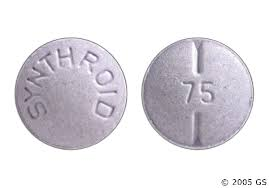
- Levothyroxine 88 mcg (olive)
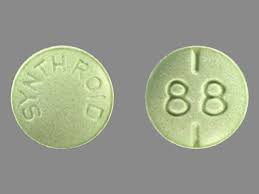
- Levothyroxine 100 mcg (yellow)

- Levothyroxine 112 mcg (rose)
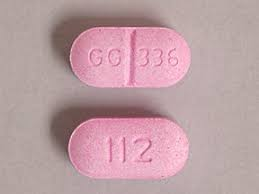
- Levothyroxine 125 mcg (light brown)

- Levothyroxine 137 mcg (dark blue)
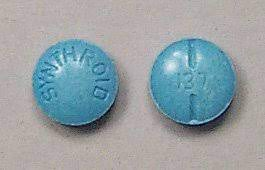
- Levothyroxine 150 mcg (blue)

- Levothyroxine 200 mcg (pink)
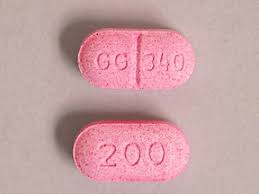
To get a better picture of Levothyroxine you can also refer Levothyroxine pill image.
What Is Levothyroxine Used For?
Levothyroxine is used to replace the missing levels of thyroid hormone when the body is not able to produce enough thyroid hormone. Levothyroxine medication is also prescribed to treat thyroid cancer. It helps decrease the size of enlarged thyroid glands also called goiter in patients with thyroid cancer.
Levothyroxine is a thyroid hormone that is used to replenish thyroid hormone levels in your body in order to regulate metabolism and bodily functions. If we talk about the Levothyroxine mechanism of action, it metabolizes in the liver and is eliminated through the kidneys.
Orally administered Levothyroxine solution is absorbed 40% from the jejunum ileum and 80% from the upper ileum. The relative bioavailability of Levothyroxine tablets as compared to an equal dose of Levothyroxine solution is around 93%
Levothyroxine Dosing
Levothyroxine dosing depends on your age and body weight. Usually, doctors begin the treatment with a lower Levothyroxine dosage. The lower starting dose of Levothyroxine can be adjusted later. Adults may be prescribed Levothyroxine 50 mcg or 100 mcg once a day.
Elder people over 50 years with heart diseases or other considerable conditions may be prescribed lower doses. Levothyroxine doses may be adjusted or changed after a few weeks depending on the response to treatment and tolerance to the drug.
Make sure you follow the exact Levothyroxine dosing guidelines provided by your doctor or pharmacist while prescribing Synthroid. Do not skip or alter your Levothyroxine doses without asking your doctor. Typical dosages may differ from your doses so don’t misunderstand and stick to your specific dosing instructions.
Thyroid Hormone Levothyroxine Interactions
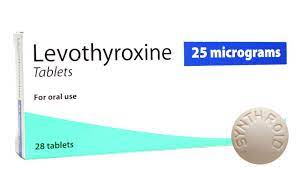
Levothyroxine interactions with certain supplements, foods, or other drugs can prevent it from performing effectively in order to maintain thyroid levels in your body. These may reduce Levothyroxine absorption in the body. Certain drug combination can also cause a risk of side effects.
Levothyroxine drug interactions that may occur with other medications include Antacids, cholesterol-lowering medications, sodium polystyrene sulfonate, pantoprazole, omeprazole, antiseizure medication, and rifampin. This is not the complete list of drugs so make sure you tell your doctor about any other medications you are using.
Levothyroxine may also interact with some supplements such as iron, calcium vitamin C, aluminum, and magnesium. Certain foods or supplements may decrease the absorption of this drug.
Some foods to avoid with Levothyroxine in order to prevent interactions include walnuts, grapefruit, coffee, soy products, and dietary fiber. You should also avoid drinking alcohol while taking Levothyroxine as it can affect Levothyroxine absorption.
Levothyroxine For Dogs
Levothyroxine sodium is FDA approved for use in dogs. Levothyroxine for dogs is used as a replacement therapy in order to treat reduced thyroid function in dogs. Hyro Tabs and ThyroKare brand-name drugs are primarily used to treat underactive thyroid or hypothyroidism in dogs. These drugs contain Levothyroxine as the active ingredient.
Levothyroxine Side Effects
Common side effects of Levothyroxine which go away within a few days include weight fluctuations, headache, diarrhea, vomiting, changes in appetite, fever, altered menstrual cycle, heat sensitivity, joint pain, and leg cramps.
Levothyroxine may cause some side effects like any other prescription medication. Most side effects for Levothyroxine only occur when people do not follow the dosing instructions or take higher doses.
Some side effects may be serious and may need medical attention. Severe side effects of this drug include shortness of breath, stomach pain, wheezing, hives, flushing, and swelling in hands, lower legs, feet, or ankles.








